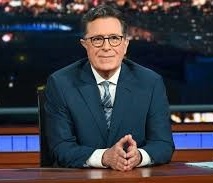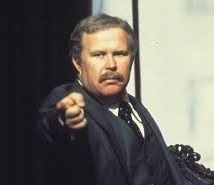|








|
Stephen Colbert, Meet Arthur Jensen


Eleven years ago, Stephen Colbert hosted a screening of Network in New Jersey, followed by a discussion with Dave Itzkoff, who wrote about the classic film. Colbert has listed Network as one of his favorite movies, including in an interview with one of its stars, Robert Duvall. I can only wonder if he’s thought of Network recently, after the shocking cancellation of his show on CBS.
As has been well documented, Network, written by Paddy Chayefsky and directed by Sidney Lumet, predicted the “news as entertainment” ethos that dominates today. In 1976, when Walter Cronkite, David Brinkley, Mike Wallace, John Chancellor and other luminaries were still on the air, the story told was viewed as satire. News divisions still had some amount of freedom, still considered a public service, so the idea that networks would treat news as just another product seemed farfetched. Chayefsky always said that he did not consider the story a satire, and history has proven him correct.
Network’s biggest cultural imprint came from the character Howard Beale (Peter Finch), a once-respected news anchor who starts ranting and raving following a nervous breakdown. In the film’s seminal scene Beale gives the famous “Mad as Hell” speech about people’s TV induced fear and desensitization. Of course his network plays upon what Beale incites for a ratings bonanza, building a whole lineup of pseudo-news around him, such as “The Mao Tse-Tung Hour.” Not quite as resonant, at least initially, is what brings Beale down, and here is where the Colbert echoes percolate. One night Beale rants on air about a Saudi takeover of his network’s parent company, which stirs enough outrage that the government blocks the deal. The takeover’s failure sparks outrage from the company’s CEO, Arthur Jensen. Beale’s ratings success matters little to Jensen, as his star just stopped a huge amount of money from changing hands. In one of the most stirring monologues in movie history Jensen, brilliantly played by Ned Beatty, commands Beale to repent and submit himself to “one holistic system of systems, one vast and interwoven, interacting, multivariate, multinational dominion of dollars.” If you have not seen this before, please click on the link, because its power is beyond what I could describe.
While not the ratings magnet of Howard Beale, Stephen Colbert has been #1 in the 11:30pm time slot since 2016. He’s also garnered critical acclaim, but none of that mattered. Like Beale, Colbert had “meddled with the primal forces of nature.” CBS’s parent company, Paramount was finalizing an $8.4 billion merger with Skydance Media, which required approval from the Federal Communications Commission (FCC). A couple of weeks earlier, CBS had paid $16 million to the President to settle a case many legal analysts and industry insiders considered very weak. Two days before his cancellation, Colbert on his show called the settlement “a big fat bribe”. Six days after the cancellation the FCC approved the merger. Colbert had criticized the President many times before. He had criticized his own network at times, but he had never jeopardized a billion-dollar deal before.
The CBS party line is that the cancellation is “purely a financial decision against a challenging backdrop in late night.” In fairness, “The Late Show with Stephen Colbert” has been losing money for the past several years, as have many of his late night competitors. Viewing habits have changed since Johnny Carson’s heyday, even since David Letterman’s heyday. The overall viewing share has declined enough that the ad revenue shrank past the point of profitability. True enough, but if this were purely financial, why didn’t CBS try other cost-saving measures such as NBC did by cutting the band from “Late Night with Seth Meyers?” Also, if Colbert’s show was that much of an albatross, why keep it going until May 2026, as CBS did? CBS could have worked out with Colbert a mutually agreed on parting of the ways, which would have avoided much of the negative coverage, but by all accounts, they didn’t even try. The only reason that makes sense is that Paramount ordered CBS to cancel Colbert as a signal that nothing would interfere with the merger.
In Network, Beale’s capitulation to Jensen’s world view has a massive disheartening effect. Colbert has not given in, but the cancellation’s impact feels similarly deflating. Corporate ownership of mass communication is nothing new, but I had always seen that as a vestige of traditional capitalism. Corporations compete against each other, and the one that sells the most, or becomes the most popular proves triumphant. What provided comfort was a belief that at least in some ways, capitalism served as a meritocracy, a survival of the fittest. For TV, ratings were always the measure of success or failure. The best TV shows may not have always made it, but at least the most popular did.
Too often under today’s rules fairness doesn’t matter, and neither does merit. Not even popularity matters that much anymore. Jensen said that it's “the international system of currency which determines the totality of life on this planet,” and added “That is the natural order of things.” That may or may not have been fiction in 1976, but it rings all too true today. What happened to Colbert may have only been the clearest window into that reality. Arthur Jensen would be proud, but where that leaves the rest of us is an open question.
Adam Spector
August 1, 2025
Contact us:  Membership Membership
For members only:  E-Mailing List
E-Mailing List
 Ushers Ushers
 Website Website
 All
Else All
Else
|